Are you being a doormat in your business?
Do you constantly put everyone else's needs ahead of your own?
If so, you're not alone. This week, we're focusing on one way to mitigate the 5 core symptoms of underearning: learning how to say "no" with class and authenticity. This is the third in a series of videos this summer about overcoming the cycle of underearning.
As a mom and recovering pleaser, I have struggled with this issue personally for YEARS. This week's episode shares some examples and word choices you can swipe to help you practice saying "no" with class and confidence before the moment strikes. I also share an important warning about the tricky way your "no" can turn into an unwanted "yes" or a straight-up lie if you're not careful.
Share your thoughts and ideas in the comments. Your insights may spark a conversation that helps someone else!
Mentioned in this episode:
If you haven't already accessed this week's bonus content, you'll want to do that here. Not a member yet? It's free! When you register for email updates, you also get access to episode transcripts, worksheets, and other downloadables!
Fashion jewelry from Kerianne at FancyBargain.com. Tell her you saw her bling on Creative Freedom!
Video clip/song: "Yes" by LMFAO
Music: "Welcome to the Show" by Kevin MacLeod
Licensed under Creative Commons: By Attribution 3.0
Every day, we're tasked with thousands of decisions.
How many? Well, Cornell University researchers said we make about 226 decisions just on FOOD in an average day.
The total number for adults is somewhere in the range of 35,000 decisions a day. Many of them are impulsive, and logic-driven (pro/con, etc.), but that's STILL a lot of remotely conscious decision making each and every day of your adult life.
Kids only make about 3000 decisions a day. Ahhh, those were simpler times, right?
Here's a decision making tool that I've used for myself and my clients for years now - one that gets immediate results and gives you clarity when you've probably been feeling stuck on something for a while, maybe even overwhelmed at the prospect of having to choose from several equally appealing (or unappealing, as the case may be) options.

This is just one of the tools you'll be working with in Your Breakout Year - my summer workshop for creative entrepreneurs. This program is designed to help you map out AND implement a clear path to a six-figure annual revenue stream.
THAT piece is the idea/concept/decision that holds the most energy for you, so that's where you need to act first (yes, even if you don't WANT to, which is another thing altogether).
The brain is a funny thing. When we take something out of one modality into another, our brain gets to work on the problem in a different way. By changing the way you assess the situation (from emotional or logical to visual), your brain has a new way of looking at the problem. The old block (which is probably a conflict between emotional and logical) is interrupted and you're able to make a decision so that you can move forward.
Often times, it doesn't matter what you decide, only that you finally make a decision so that you can get momentum again. So even if you "randomly" select a paper ball, you've made a decision and can move forward.
If you're a tactile processor, you might ACTUALLY write each option on a piece of paper and throw them on the floor. But then you've got a lot of cleaning up to do, which is totally NOT my jam. 🙂
Like I said, the messy room technique is is a powerful tool that's quick and easy to use to get clarity now, and get moving again.
Whether you're starting from scratch, been hobbling along at this for a while, or you're ready to expand and add a new revenue stream to your creative business, Your Breakout Year is the exact process I've used with clients - for over a decade now - to help them get clear on what really matters and build out a business model that gets them there faster, with less hustle, and more ease.
Courses and classes alone don't get the job done. You'll just end up with a lot of information and zero implementation. This is an implementation-heavy program because I believe that if you do the work, you'll get results. So doing the work is baked into the program. No "learn now, implement later" in Your Breakout Year. Implement as you learn, decide what works and what doesn't, cut the fluff, and see real financial results in your business.
There are still a few spots left for early bird pricing, and a 4 installment payment option to make it budget friendly.
If you're ready to find your right audience and make good money doing what you love without selling your soul, join me for Your Breakout Year.
This week I had an AMAZING photo shoot that's been several months in the making. I knew when I landed in Nashville, starting over would take up a good portion of my first year here. I also knew that I had projects that still needed to move forward: I've been sitting on Creative Freedom for a while now, and The Damn Whippersnappers have promised to visit this summer for a recording session. So with a new book and new music in the works, of COURSE I needed to get the website redone.
Only, I didn't know anyone in this town, so I had no idea how long I'd have to wait, how much it would cost, or anything. Luckily, my best friend, Google helped me out. I met Emily, a wardrobe stylist from Effortlesstyle here in Nashville. She came over, looked at my closet and said "let's just start from scratch, okay?"
hee. hee.

While I know how to clean up, I've never been at the bleeding edge of style, and I told her that. My closet is full of black, black, and more black - with a splash of solid color here and there. So I gave her a budget and she went to work. A week or so later, we met for the fitting. There was really only one piece I couldn't bring myself to like. Everything else was wonderful - and a lot of it I wouldn't have picked for myself. Like this floral top. When I first looked at it, all the voices in my head took a swing at me:
"Oh, you're too big to wear white!"
"That floral print is just going to draw all kinds of attention that you don't want."
I swallowed hard when she showed it too me. I knew Emily could sense my reluctance. "Just try it on." she politely insisted.
I did. We found a keeper.
I had just raised my threshold of belief around what was possible for my wardrobe. Emily's a professional that's been doing this for years. Despite that, it was hard to trust her at first because I didn't know her. I didn't believe she could style a plus-sized momma like me.
Luckily, she made it easy to like her, and her ensemble choices were on point, so trust came quickly.
Which was good, because the hair and makeup artist I had originally asked to do the shoot booked herself another appointment and was unable to make our shoot date. It wasn't her fault. I was trying to coordinate all the details myself, and things didn't come together. Frantic, I asked Emily if she had any suggestions.
Panic turned to relief, but I had no idea how much I'd be paying for TWO people instead of one.
I swallowed hard again, and just trusted the process.
I arrive at Emily's house on the day of the shoot for hair and makeup. Mind you, two total strangers are about to have their way with my head. The ONLY thing keeping me from not showing up is the commitment I made to my photographer, Ashley.
That, and I trusted Emily. She hadn't steered me wrong yet, so I figured she wasn't going to start now.
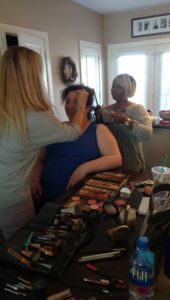
I knock on the door, walk in, and I'm greeted by two of the sunniest, most enthusiastic women I've ever met. Both hard-working artists, both incredibly talented. Both eager to make magic happen.
Why did I ever doubt Emily?
Within minutes they are both working on me: Angela at the front, Genia at the back. We're chatting, really connecting, and they're making it easy for me to trust them. But...
I don't even know how much time has gone by, I can't see a mirror, and I'm still too nervous to eat any of the snacks Emily's put out for us. I did manage to down a glass of water, because I kept telling myself "it's gonna be hot outside, you don't want to die of heat stroke!"
Still, I think I managed to keep my self-doubt to myself as we talked about building a business doing what you love, something I'm pretty passionate about. My fear was, hopefully, masked by my enthusiasm for profitable creative businesses.

When they finished, I snapped a quick photo of my glam team and off we went to meet Ashley at Cumberland Park. When I got in my car, I had all I could do to keep from crying. I looked GOOD! Like, I almost didn't recognize myself. I had a vision of what I wanted for the shoot, and even hired Duane "The Hair Fairy" Edlao to cut my hair before I met these ladies to make sure that it would do what we wanted it to do. But to see it actually come to life?
Whoa.
We headed off toward Nissan Stadium to meet Ashley for the shoot. This is the first time we've met in person, and she looks happy, so I'm feeling more relaxed at this point. She's got some ideas about how to get in all the wardrobe changes and make the most of our time together.
The first few pictures felt awkward to me - because my inner critic was having her way.

There was a couple sitting at a picnic table across the way. They both stopped and looked up as my entourage pulled up with all our gear. I joked about being famous, but inside I was a self-conscious mess.
Despite these women all being super talented professionals, my inner critic was having her way with me. I told Ashley to "just shoot everything" because I knew that candid moments would probably end up making the most "natural" shots, plus we'd get some behind-the-scenes shots, too, which would be great for me to share with my clients in A-club. In truth, I was just hoping that, if she shot everything, there might be something that I could use.
Good thing Emily was listening, because she took some great candids, too. Like the shot of Angela, above, touching up my face, or this one, which is quickly becoming one of my favorites.
When I saw the first photo, I knew I was in good hands and I could relax. That's when we had REAL fun!
We joked, got silly, and just enjoyed being together - creatives whose only agenda was to create. Make magic happen. That was all we had to do, and when we could really let loose and trust each other, poof! The magic was there naturally.
The rest of the hour-long shoot went by fast, and it really felt like we were a team - working together to tell a compelling visual story. I look forward to seeing the proofs that Ashley took. Here's a sneak peek from the back of Ashley's camera...
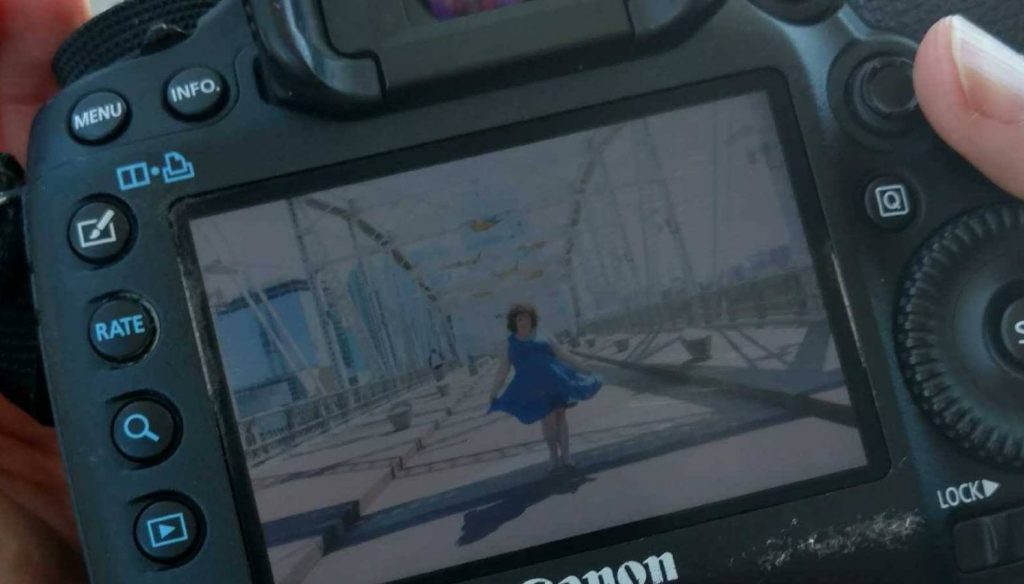
This photo shoot was a massive investment in the future of my company, and it would be easy to just stop there...
...But that would be the least important part of the story.
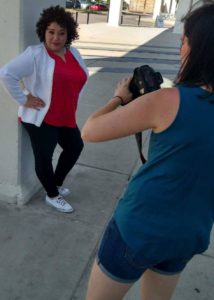
As the pictures started appearing, people on Facebook started asking me what the shoot was for. It was easy to say "new book, new album, new website," but that wasn't entirely true. It was also a "new me" of sorts.
In the past, I would have tried to DIY as much as possible and keep everything on the cheap - not to be efficient or save money (though those are the excuses I would have used), but because of my own self-worth.
I put at least ten times the money into this shoot than any other shoot I've ever done. I'm not saying that to brag. I still feel strange about it, to be honest. I tell you this because there was a time in my life where I didn't believe I was WORTHY of investing "that kind of money" in me or my dreams.
Some days, I still struggle with my worthiness.
My early photo shoots were courtesy of my kid, or good friends who were skilled with a camera. I actually hired a photographer and hair/makeup artist for my last shoot because I wanted to get some specific shots for the album. I was leery then about spending "that kind of money" on a project that had no guarantee of completion, let alone success. But I was so happy with the results that I used those pictures all over the interwebs for a couple of years.

This time, I had a team of three incredible women who had my back the entire time (four, counting my photographer!). They probably had no idea of the "who do you think you are?" trash talk my inner critic was laying on me. At least, I hope they didn't. I am thrilled that they made it SO easy for me to just be ME in front of the camera.
The next day, I was talking with one of my coaches about my book, online course, and live event all built around the foundation of Creative Freedom. One of the last things she said to me was about the pricing for my upcoming event. I've been in a holding pattern for WEEEEEEKS because I haven't been able to decide how to price it or how and when to offer the online version. I told her I feel confident that I could easily charge twice the price because I believe it'll bring a solid 5-10x return on investment, but I was keeping the intro rate low because I wanted to fill the program (totally an ego thing, by the way).
When she looked at my pricing and asked about my motivations, she reminded me that sometimes, when we offer discounts and low-ball our pricing, it doesn't actually empower our clients, because we're modeling a behavior that comes from a place of scarcity instead of abundance. She then asked me "what if, by lowering your prices, you're denying your clients from having the same experience you just had at your photo shoot?"
Eyes Opened.
If you've got a healthy relationship with money, this probably doesn't apply to you, but if you struggle with naming a price that feels right to you because your inner critic is asking "who will pay that?" - this could be helpful.
The answer to the "who will pay that?" question isn't found in the circle of people you've been begging to buy from you. The answer is found in the faces of the people who light up when you enter the room and say "where have you been all my life!?!?"
Sadly, most of us build our careers around the former and not the latter.
This is one of the reasons I encourage my clients to develop a $25,000 offer... not because anyone will ever buy it (though it does happen), but because it gets you thinking differently, so that when you offer something for $2k or $5k, you'll feel more confident around the real value you bring to your work.
What could happen (for you and your potential clients) if you just created and asked for the price you want without all the baggage attached?
Because it doesn't matter what price you pick, there will always be someone that can't or won't pay it. But there are also probably a few people who will.
Owning your dreams, without selling your soul. Finding yourself and building a life and business that works for who you really are and what really matters to you. Making good money doing what you LOVE (and all the ladies from my shoot love what they do). THAT is what Creative Freedom is about, and I can't wait to share more of this new evolution with you.
Oh, and tickets for the virtual workshop and online event will be on sale soon. If you're not already on my list, get there to be one of the first to know about it!
I think it was my grandmother who first told me that you never get a second chance to make a first impression. I was going to her church for Easter Sunday, and, of course, I had to look my best. I was representing my family, I was showing up for God, and (probably most important to Grandma) her reputation was at stake.
It only made sense to put my best foot forward. I had to be well dressed, well groomed, AND well behaved. No pressure.
Then, maybe a year or two later, I heard it again, in a shampoo commercial.
So it's no wonder that those words strike fear into the hearts of many creative entrepreneurs when they attempt to bring their Great Work into the world (especially for the first time). One wrong move, one slip, and it's all down the tubes. Everything's over. Cash it in. We're done. Between that sentiment and the old saw about opportunity only knocking once, it feels like the stakes are incredibly high.
But are they really?
Do you really only get "one shot, one opportunity to seize everything you ever wanted, in one moment"?
Well, yes and no. Mostly no. Sir Richard Branson says that "opportunities are like buses; there's always another one coming." But there are things you can do to prepare yourself for the moments when opportunity comes a knock-knock-knockin' on your door. This week's episode explains.
Here's the "quick and dirty" summary from this week's episode:
Mike Michalowicz, a friend and author of the book Surge, explains that surfers can't ride every wave. They have to be able to get in front of it and be ready to stand up and ride. If the wave is too far away (or even too close up), they can't get in a good position to get up and ride. And if they chase every wave, they'd spend all day paddling and never get the chance to hang ten.
Waves are plentiful, so it's less about hitting every wave (or even finding the perfect wave), and more about being selective in the opportunities you take so that you can spend less time paddling and more time riding. Will you wipe out sometimes? Sure. But that's part of what keeps everyone from surfing: you have to be willing to wipe out a few times in order to catch the big wave.
What do you need to say "no" to, so that you can say "yes" to what really matters? Share your thoughts and ideas in the comments and be part of our Rising Tide.
If you need support, encouragement, and help bringing your vision to the world and preparing for your next opportunity, Accountability Club is now open for enrollment. Only a few seats remain, and I'd love to see you inside this community of doers. Our next training call is Feb 25!
We're a few episodes into the new season of Creative Freedom, and I'm giddy at the overwhelmingly positive response at this season's show. Fingers crossed I don't jinx anything along the way.
Getting to this point wasn't easy. As I alluded to in Episode One this season, I took a LOT of time off. The last show of Season One aired near the end of August. That's almost a year between episodes, and I'm sure that at least one person thought I wasn't coming back.
Well, I'm back with a vengeance, and an upgrade to boot. But not every upgrade happens with ease. In fact, most of the time, there's a desire to upgrade BEFORE you're ready to actually take the plunge. That's what happened to me.
Here's this week's episode to give you the glossy version. Read on below for the juicy details.
Creative Freedom was actually born from a video challenge that Jason Stein and Rachael Albers launched in a facebook group. I knew I wanted to do more video, but I'd been stalling, and the Wisdompreneurs video challenge was a perfectly-timed kick in my pants to get things going. So I did.
But then life happened, as they say, and by August, there was too much on my plate to keep up with a weekly series. So I pulled back, took a hiatus, and spent time trying to figure out what I really wanted to do next.
As a business consultant to creative entrepreneurs, one of the things I teach is to build your business around who you are and what works for you. I thought it fitting to practice what I preach.
It didn't take long for me to decide that I wanted to do another season. I enjoy video, because it's a chance for me to "be on stage" and help people at the same time. But sitting on a yoga ball in my living room didn't leave me feeling like my best self. I wanted better audio for sure, and hopefully a set upgrade. Then, we decided to buy a house, which meant packing up everything and relocating it. So even my makeshift "set" wasn't going to be available for filming.
We moved and, in the process, I thought I was going to get an office - a studio where I could set up and film a show with better production values. I started painting, and sharing my progress on Instagram. It was exciting to watch the process unfold.
And then life happened again, and my teenager moved back in. He needed a room, obviously, which meant the office was a no-go. It's all good. I set up a mini-office in the fireplace room:

For the most part, it works well, and since this photo was taken, I've added another level of shelving (milk crates ROCK!). But it still doesn't give me a viable space in which to record video. In fact, when I do webinars, I often move over by the window, which works for up-close, talking head-style videos, but doesn't give me the ability to be my fun-loving, arm flailing self.
That, and there was simply no room for my fancy lighting set-up. Last January, I invested in softbox studio lighting so I could film better quality videos. They have a small footprint, but they still take up space, and the angle of the roof in the new house doesn't allow me to get the lighting up high enough to be effective.
Cue the violins.
So my friend and mastermind buddy, Pam offered to store my lights at her place. And then, in a stroke of supreme generosity (or madness, I'm still not sure which), she agreed to let me film this season's episodes at her place. It's an entire floor of studio space, with plenty of room for everything I could possibly need. I could bring the Damn Whippersnappers into that space and do a show, it's so huge.
I got way more than I bargained for... in a good way. I wanted to upgrade, sure, but I had no idea the Divine would bless me with something this awesome.
Still, I wasn't ready for it.
The first season of the show was recorded a bit more, um, on-the-fly, shall we say? It was not uncommon to script, film, edit, and upload the video in a single day. But now, I had to develop and coordinate a shooting schedule. That way, I could film multiple episodes in a single day. It would be impossible, not to mention rude, to just show up at Pam's house and say "Hey! I had a great idea for a video today, let me in so I can film it!"
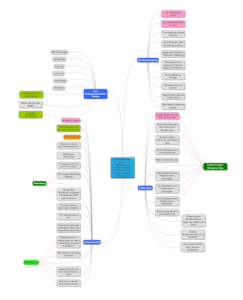 Instead, I had to be more intentional. I developed a slate of episode ideas for the entire season. I think there are about 45 or so topic ideas on the mind map you see here, in various stages of completion.
Instead, I had to be more intentional. I developed a slate of episode ideas for the entire season. I think there are about 45 or so topic ideas on the mind map you see here, in various stages of completion.
Then, I had to script and rehearse each episode before filming. I also had to collect my makeup, wardrobe, video and audio equipment, and any props I'd need for filming, since Pam lives a few miles away. I couldn't just run back home if I forgot something. That meant developing a checklist to make sure I always had everything I needed when I got to Pam's for a day of filming.
Once I arrive at Pam's, I've got about five hours to get it all done. Why five hours? Because I have a kid that gets off the school bus and I've got to be home for him! During the summer, I have more flexibility, but I still want to keep my shooting time tight, to keep my costs low. Pam's "doing me a solid" right now, but one day, I may need to rent studio time, and that has a cost.
Just because it's free now doesn't mean it won't cost later. Being efficient always pays off. (Tweet this)
I set up and test all the equipment. It takes about an hour to set up the lights, get the balance right, and test the audio gear. I am a one-man camera crew for the most part, so it's up to me to make sure things work properly. Sometimes the lights are a little too hot, and I might not catch it until after I've filmed everything. Oh well. Next time. #ProgressNotPerfection
Once everything's up and running, I have to make sure my hair, makeup, and wardrobe work well and actually shoot the videos. I wish I could say that every video happens in a single take, but that would be lying. Shooting the end of this episode took me over an hour - so I only filmed three that day.
I can usually shoot 4 episodes per session. Then it takes about 30 minutes to pack everything up and get ready for the drive home. Why five hours? Because I have a kid that gets off the school bus and I've got to be home for him!
Now I've got a handful of videos that need to be edited, posted, scheduled, and ready for broadcast. Yep, I do that, too. But like I said I enjoy video, and since I'm a Fusion type, I actually do a fair job at it. Plus, I'm not so busy yet that I feel the need to hire it out.
I'm familiar with filming so most of this wasn't news to me. The only variables I didn't know about related to how long it would take to set up and test the lights and sound, but I've done a lot of tech rehearsals for theater, so I had an inkling. Yes, this is a LOT of effort, and I wasn't sure that, once I dove in, I'd be able to maintain it.
Frankly, with everything else going on, I wasn't ready to assume this much responsibility before winter was over. We were moving, and yes, the divorce is happening. Had I launched season two in the middle of all of that, I probably would have had a mental breakdown. I wanted to create a new normal, and in order to do that, you have to be ready to maintain it - or it isn't normal, is it?
The next time you're chomping at the bit for an upgrade, ask yourself if you're aware of the new responsibilities that come along with the upgrade. Then ask yourself if you're ready to do what it takes to maintain your "new normal".
The answer might surprise you.
What do you want to upgrade? What's waiting for you on the other side of your next upgrade? Are you READY for that new level of responsibility? Share your thoughts and ideas in the comments, and be part of our Rising Tide Community.
"You can't win if you don't play."
Mom used this sentence to justify a lot of behavior when I was a kid: learning to ride a bike, auditioning for plays, joining the cross country team (I took 11th place in the city meet). And yes, mom played the lottery. She had a winning streak where, with a little help from technology and lottery dream books, she won several days each week for a few weeks. Naturally, those words rang through my head every time I was faced with a risk-reward decision.
Until this week.

If you follow me on Facebook or Twitter, you may have already heard about how I found this lottery ticket on the ground while I was on a field trip with my kid. I thought it was trash (LITTERBUGS! ARGH!), so I picked it up to throw away when we got to the car.
But when I saw it was a lottery ticket, I figured I'd check the numbers when I got home, just in case.
I won the BIG money, honey! TWO WHOLE DOLLARS! WOO HOO!!
Every morning, I sit down to do The PEACE System (a process I created to help clear my head and prioritize my day). Because field trips can be stressful - particularly with a special needs kid - I made a point of setting the intention to look for miracles.
Frankly, a well-behaved child would have qualified as a miracle in my book. I certainly wasn't expecting free money to fall at my feet. But hey, I'll take it!
I asked for (and was looking for) a miracle, and I got it. And the kid behaved, too!
You've probably heard stories about people who say "I won the lottery and it changed my life." Never did I think I'd be one of those people, since I don't play the lottery.
But winning those two bucks most certainly changed my life. If you want to test out your luck as well, you can go to sites like 바카라 사이트, for example.
"You can't play if you don't win" is a double-edged sword. In a way, I did "play" because I picked up the ticket and cashed it in. But in a way I didn't play, because I didn't actually buy the ticket. It wasn't even given to me (in the traditional sense). And the person that dropped the ticket probably thought it was a "loser" because they played $10 and "only" won $2. They lost money on the deal.
But from my perspective, I was $2 richer!
The last 18 months have been arduous and hard for me on a lot of fronts. At some point, I probably faced down some depression, though I was never clinically diagnosed. I've done a LOT of questioning my worth, my value, and why I'm really on this planet in the first place.
Two dollars won't even buy me a soda at my local restaurant, let alone pay my rent, but it was a sign. A clear sign that miracles are there if we are looking for them. I know that sounds kind of mystical and metaphysical, but it's true. I found that money because I was looking for it.
Well, I was looking for a miracle, and I chose to see this "win" as a miracle.
You have to have your eyes open and show up.
You have to be willing to go for what matters to you - even if it seems unreasonable. Even if it seems impossible. If it's in your heart to have it, you have to be courageous enough to show up for it. And keep showing up consistently.
In that respect, Mom was right: you can't win if you don't play.
But she was also wrong. I won without playing "the game" (by society's rules, at least). That little lottery ticket opened a Pandora's box of questions about the "teaching" that's been passed down through my family for generations. The "lessons" and "stories" that, in a previous era, had to be true for survival no longer serve the person I'm becoming in this era of creative entrepreneurship.
In the past, if you didn't "play by the rules", you wouldn't be taken seriously, and you probably wouldn't even get a foot in the door, let alone win. There were gatekeepers, expectations, and unwritten "rules" that were foisted on you by your industry, society and "the world". These rules were designed to keep certain people out, and to protect the survival of others. You had to play their way, or you simply couldn't play.
Now, you have a lot more latitude to define success on your own terms and not just survive, but thrive. You can create your own career, doing what you love, and make good money doing it - without selling your soul. That's the entire premise of how I help my clients!
Those old stories that once served to protect, inspire, and motivate me, had been holding me back from the life and career I was meant to have. I couldn't see that until I won the lottery.
What thoughts, beliefs, and stories do you hold as true, that might actually be limiting your success without you even realizing it? Untangling those beliefs and thought patterns can be tough, but the rewards far outweigh the risks.
But here's the other thing that rattled my brain. I won $2. Winning anything was contingent upon someone else. Somebody else played the game, bought the ticket, left it on the ground. At least three other people walked right past the ticket before I picked it up. In short, I had no control over the outcome. All I could do was be in the right place at the time of the miracle.
Miracles are awesome, and they can feel magical. But they are, in many ways, unpredictable - even if you're looking for them. You don't know when they'll arrive, or in what form, and sometimes it's hard to know if it even is a miracle until well after the fact. Sometimes the worst thing that ever happened to you is actually a blessing in disguise... a miracle you won't see until years later.
In life, we can wait for others to open doors for us, or we can make a plan and get sh*t done. (Tweet This)
Waiting around for miracles is the snail's path to success. Can it happen? Sure! I just won the lottery, for crying out loud! But, I only won $2, because that's all the ticket was worth. Someone else got to dictate the terms of my success. I could only win what they played and paid for.
I don't want someone else to dictate how successful I can be. I don't want someone else to have that much influence over my success journey. I mean, I won't turn away blessings when they show up - even the $2 variety - and I'm not going out of my way to play the lottery, either.
I know I can't control everything - and some might say that control, like safety, is an illusion. But if I set an intention and follow it with consistent action, I'm going to move the ball further down the field more often than the guy standing around, waiting for a winning lottery ticket to fall at his feet.
Will there be setbacks? Most likely. As we all know, the so-called "overnight success" stories usually involve a lot more preparation and hardship than we realize. As Thomas Edison famously said, "opportunity is missed by most people because it is dressed in overalls and looks like work."
I'm no stranger to hard work, although I'd like to be. 🙂
There were other gems of discovery that I'm still unpacking, and I'm sure you could tease out a few lessons of your own from this story, but ultimately, while I welcome all the miracles and blessings coming my way, I'm not going to sit on the sidelines and wait for them. I'm going to keep showing up, sharing my Great Work, and defining success on my terms. Not my mom's terms, or the terms of my ancestors, or even the terms of my fans and clients.
My game is the only game that matters for me. It's a game I'm happy to play, and one I can't lose, because I make the rules.
In my house, there's a never-ending battle that's almost as epic as the fight for the remote control.
The thermostat.
My husband likes it hot. He closes the vent in our room and bundles under at least two blankets even during Summer!
My son likes it cold. If it's warmer than 65, he'll turn the thermostat down to 50 because he thinks that'll make it colder faster.
Me? I like it in "the dead zone" - a comfortable 70-72 degrees. Not too hot, not too cold.
Needless to say, we've had a few arguments about this. In fact, hubby and I are finally switching sides of the bed this week because he's been sleeping closer to the vent (which is why he keeps closing it).
But...even more datstardly than our family fight for the house thermostat is the epic battle that's been going on between my ears for years with my metaphorical "success thermostat".
You may have heard it called an upper limit problem - that's a term Gay Hendricks used in his book "The Big Leap." Like a thermostat, our brains have a "success set-point" that keeps us comfortable. When we get too far below that set-point, we get uncomfortable, and start working to turn up the heat on our success. But I had a cap on what I believed I deserved. My "success ceiling" was a set-point that actually kept me earning poverty-level wages. No joke!
It was as if every time my money situation started improving, or things started going very well for me, invariably something would happen and things would start to fall apart. My success set-point kept trying to cool things off just as I was heating up!
In her book "Overcoming Underearning" Barbara Stanny says that "money is a metaphor" and that "under-earning is a symptom" - specifically a symptom of a lack of self-worth or self-love. It manifests differently for each person, but ultimately, it centers on a success ceiling/upper limit problem around what you think you deserve.
This week's episode of Creative Freedom revels how to know if you're a chronic under-earner, how I discovered my under-earning success ceiling, and how I've worked to eliminate my upper limit problem in my own life. Oh, and you'll hear bits of my U2/Journey mashup from the 300 songs project.
One look at the Symptoms of Underearning from Underearners Anonymous and you'll have a better idea of whether or not your current financial state is because of a conscious choice to live on less, a short-term slump, or a chronic condition that's due to something deeper.
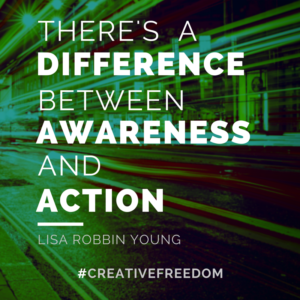
1. See the truth and OWN it. Just like a real thermostat setting, we have to make adjustments if we want to see things change. For most of us, we can't just "flip a switch" and solve the problem. Further, the "temperature" of our situation will most likely change gradually. You can't go from 32 degrees to 70 degrees in a matter of seconds - it takes time to turn up the heat! Decide on your new direction. What's going to change for you? Then commit to it, and be willing to make small (even microscopic) changes as you move toward your new set-point. The smaller the better actually. It might feel more tedious and time consuming, but micro-commitments are more likely to stick and lead to lasting change because they don't activate the fear centers in your brain. It's the fear center that triggers the thermostat to go back to what's "comfortable" - clearly a relative term when it comes to success.
2. Be wary of people who aren't used to your new settings. They will be uncomfortable (so will you). I have a colleague that says "new level, new devil". Remember what I've taught you before - you train people how to treat you based on what you've come to accept from tehm and what they've come to expect from you. Changing your success thermostat means you're changing the expectations. Some people won't like that - get used to it. It happens. The key is to recognize when people are trying to change your settings and stay the course even if things start to get a little (okay, a LOT) uncomfortable.
3. Believe you are worth it and stay vigilant! This is where all the micro commitments make a difference. Trying to re-program your brain to overcome years of unconscious programming ain't easy. When you've believed for decades that you're not capable of achieving a certain level of success, your brain may have difficulty accepting new ideas that seem to fly in the face of that old understanding. You need to keep looking for evidence for the file clerk in your head that says you are capable. Celebrate your wins even if they seem "small" or "insignificant" - the file clerk doesn't judge.
Eventually, the new set-point will feel comfortable. It takes time and patience, but it's totally doable.
Under-earning is one of the most prevalent problems of the creative community. From working for "exposure" to donating our time and offerings to way too many worthy causes, creative entrepreneurs need to reclaim their money making power! If you've overcome an upper-limit problem, we'd love to hear about it! Share your stories in the comments and be part of the Rising Tide community!

First an exciting announcement: A few weeks ago, I happily celebrated 500,000 views on my YouTube channel. THIS week, I'm celebrating 300 subscribers (click here to subscribe instantly)!
Confetti! Fireworks! Hooray! Huzzah!
This has been a goal of mine for several years, and I'm beyond thrilled that it's finally happened. It was a lot more challenging than I expected, and I've learned a lot along the way. As my channel grows I've developed a love and strong respect for the YouTube community. If you're on YouTube, please say hi and spread the love. Your awesomeness makes this show possible.
THANK YOU.
I was on a coaching call with a client this week and we spent a good amount of time talking about how hard it can be to shine brightly when everyone around you is complaining about your light.
"You're too bright."
"Can you turn it down a little?"
"You're always so enthusiastic about [topic]. I'm tired of it."
While occasional constructive criticism is important (when you work with me, I'm not afraid to give it to you straight), it's also important to remember that you've got Divinely-given gifts that are uniquely yours to bring into the world.
Shout it out! Tell everyone about your brand. Heck, have your brand name printed out onto face masks, hoodies, pens or mugs if necessary. Don’t hide them away; be proud of who you are and what you have achieved.
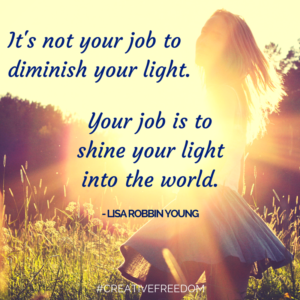
Often times, we're put down, or we feel guilty about being so awesome. And even if you're shy and reserved, it can be tough to deal with the criticism and "baggage" others want to foist on you when you're sharing your gift with the world. It often results in being overgenerous as a means to counter the criticism, to be liked, or to "apologize" for your existence.
Been there, done that.
You don't need to apologize for being awesome. We all shine in our own way, and yes, some of us are called to shine "brighter" or to a "bigger" audience (remember: size is relative. If it's your dream, it's big. Period.). That doesn't make us any more (or less) needed in the world.
Sometimes we're put in a position where we shine brighter than the folks around us because they need to get used to having more light in their lives. This isn't a statement of arrogance. Most of the awesomely talented people I know didn't ask to be awesome. They just are. But the amount of guilt they feel and crap they take for being so shiny is overwhelming. I'm reminded of the crawdads in a bucket that keep pulling each other back down so that no one escapes.
You don't have to make your light any less bright. That's what sunglasses and window shades are for. People can choose to be around you and they can choose to leave. This is a lesson I'm learning myself. For YEARS I have felt the need to dim my own light because the people around me couldn't deal with how shiny I am. I never asked to shine. I was born with these gifts, and while I've honed them over the years, it was never in an attempt to be better than anyone other than myself.
It's not your job to diminish your light. Your job is to shine your light into the world. (Click to tweet this)
There are plenty of people in the world who are afraid of the light. Heck, even Plato wrote about it in his Allegory of the Cave. But here's the thing:
Just because other people are afraid of the light, or judge the light, or shun the light, doesn't mean that you need to take it personally.
When I walk into my bedroom and flip on the light, sometimes my husband grumps about it. My light bulb doesn't get all defensive and start apologizing for being bright. That's what light bulbs do, for pity's sake! And while I might apologize for causing my husband pain, I rarely apologize for turning on the light because I needed the light to see. Don't apologize for your needs. Apologizing for your needs equates to saying "I'm not worthy of having my needs met. I'm sorry for my existence."
Word choices can be tricky, eh? But I've said this many times in the past: you train people how to treat you based on what you've come to accept from them and what they've come to expect from you. If you're constantly apologizing for your existence, then, Houston, YOU have a problem.
Katy Perry sang an inspiring song that confirms that the only way to shine is to ignite yourself:
"You just gotta ignite the light and let it shine
Just own the night like the 4th of July"
I think it's safe to say that if you don't ignite yourself - and let yourself shine - it's improbable that anyone else will do it for you.
On the surface, Independence Day is about celebrating my country's establishment as a sovereign nation. It's become the high holy day of picnics, beach fun, and fireworks.
But at the core, it's a symbol to embrace what matters most to you, hold it out for the world to see, and stand your ground. Do you think the British were particularly pleased? Hardly. They fought us for several years before and after we claimed our independence.
You'll probably face a few battles of your own (both internal and external ones). That's to be expected. As several great minds (including William Lamb and Stan Lee) once said, "with great power comes great responsibility." Being awesome ain't always easy, but you've got it in you to handle it!
Need a little extra incentive?
Our Independence Week edition of Creative Freedom brings us a special "guest appearance" - this time by Katy Perry. It's a friendly reminder to own your awesomeness.
What are you awesome at? Go on! Toot your own horn (I dare you)! How have you been holding back your awesomeness? Do you know someone else that's letting their light shine "brighter than the moon"? Share your stories, thoughts, and ideas in the comments.
If you or someone you know could use this information, please share us with them and be part of our Rising Tide! Every share helps. THANK YOU!
OH, BTW... Des is coming back from California this week, so look for new videos in the 300 songs project soon! YAY!
It's report card time around here. My youngest is struggling in gym class. Sadly, I've seen it before with his older brother.
"Won't even attempt new activities," the report card reads.
So hubby and I sat down with our 8 year old to find out what's going on.
"I can't do it." He said. "I'm not good at it."
It can be hard to try something new. And even harder to be GOOD at it - especially when you've never done it before. That doesn't mean you can't do it.
Try telling that to an 8 year old... oh wait, we did!
...what you really mean is that you've never done it well before.
Like when you say you can't sing. Yes. you can. Anyone with a functional voice box can sing. Even my husband, who can't carry a tune in a lead-lined bucket can sing SOME songs. You just have to find the right ones. Maybe you aren't Pavarotti, but even Madonna doesn't sound like Madonna (thanks, autotune).
So often we use the words "I can't" as code for "I'm not good enough" or "I don't know how." As we talked with our kid, it became apparent this was a case of being afraid to look foolish or be wrong in public. It was also a case of not being willing to ask for help to learn how to do something (or do it better).
Curse the English language!
We have gotten used to so much linguistic short hand, that we're actually programming our brains to believe something isn't possible, when, in actuality, it is. As entrepreneurs, we need to reclaim our truth and speak it without shorthand.
"I don't feel comfortable doing this, because I'm not as good as I would like to be."
"I don't know how to do it (or do it well). Can you help me?"
I've shortened my learning curve immensely in life and business by asking for help, yet, I'm the same person that still struggles with asking for help with things I think I "should" know already.
"The Shoulds" are a comfortable state of paralysis that most of us visit from time to time. It goes like this:
"I should really work out more." But you don't.
"I should really look for a new job." But you don't.
"My mother in law says I should spend more time reading to my kids." But you don't.
"My clients think I should offer evening appointments." But you don't.
And my all-time favorite: "I should already know this by now." But you don't.
In short, "The Shoulds" are a laundry list of to-do's that you have yet to accomplish - either because you don't really want to do them, or because you haven't yet figured out HOW to do them. It's a limbo-land that keeps you from taking action, and only diminishes our value as humans an entrepreneurs.
It's normal. we all go there from time to time. The trick is to keep our visits short. Otherwise, we're creating unrealistic expectations of ourselves. When we have an expectation of our capabilities that doesn't match our reality, two things happen:
Rather than root out the cause (living in "The Shoulds"), we keep beating ourselves up - over and over - until something happens. And that "something" isn't always helpful. If we're lucky, we've got a support system to help us see we're in "The Shoulds" and can point it out to us. But even that's not going to help you if you keep beating yourself up saying "Dangit! I knew I was in The Shoulds! I keep doing that! Gah!"
What are those "beliefs" that are conditioning you to stay paralyzed? How are they holding you back? What would happen if you looked at it as if the opposite was true?
What if you shouldn't already know this by now?
What if you shouldn't offer evening appointments? What if you need to find clients who prefer your current schedule?
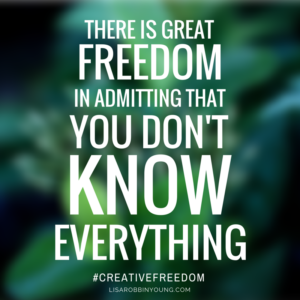
That's the other type of "can't" we're talking about: when something really isn't possible within the understanding of human experience at this moment.
1,000 years ago, man couldn't fly or use the Internet. They hadn't been invented yet! So to tell someone to hop online and check your email would probably get you blank stares. "I can't" is an appropriate response in that case.
But the more accurate response for most anything today is "I don't know how yet."
Keep all your priorities in alignment while growing your business?
"I don't know how yet."
Make six, seven, or eight, figures (as PROFIT, not just income).
"I don't know how yet."
You get the idea.
Yes, being willing to acknowledge that you don't already know everything means there's a slight possibility that you'll be a target for ridicule. But that's rare. More often,what happens by saying "I don't know how yet" is that you open doors to new learning, new experiences, new connections, colleagues, friends - and yes, clients - by being willing to learn how.
That was the lesson my 8 year old had to learn. That yes, sometimes the mean kids will make fun of how he throws the dodge ball, but by asking for help, he'll get better at throwing the dodge ball and be able to bean the mean kids out during the game.
Perhaps that's not the best way to illustrate that lesson, but I think you understand my point. Sometimes, we need to "bean" the nay-sayers in our lives, and the only way to do that effectively is to get really good at what they're telling us we can't do.
Even if we are our own nay-sayer. Sometimes I need a good beaning, myself (just ask my husband!).
Where are you saying "can't" when you're really living in "The Shoulds? What can you do today to get clarity around a particular "should" and either decide to take action or decide to let it go? Share your thoughts in the comments below.
If you're ready to get help with moving out of "The Shoulds" consider a Next Steps session to help you get some clarity.
I chuckle now as I look back on my collegiate career. Convinced that I was "too poor" to be able to afford to hire a band, a graphic designer, or a business manager, I learned how to do all those things myself. I took classes in business, law, graphic design, and music. My first album (recorded during my time in college) features no other instrumentalists. Every track was laid down electronically. I mixed my own vocals, designed my own cover. I did have a friend shoot the pictures, but that was only because he had a camera and was willing to help.
Can you imagine the comic nature of me trying to set up a shot, run around to the back of the camera, set a timer, and run into the shot again? Don't laugh. I found myself doing exactly that in a recent photo shoot for The Sweet Browns - a vocal group I'm working with locally. I think we ended up taking that shot 4 or 5 times before I got situated in time for the flash.
In my family, it somehow meant we're weak, that we can't do "it" on our own... whatever "it" happens to be. I grew up in a family of strong, independent women, and had a pretty stubborn lineage of men in my life as well. We simply didn't ask for help. The downside to all that independence is that you pass it on. I watch my boys (8 and almost 18) think they have to have it all figured out. That they simply can't ask for help. They either have to wait for it to be offered, or they have to struggle through the frustration on their own.
(more…)